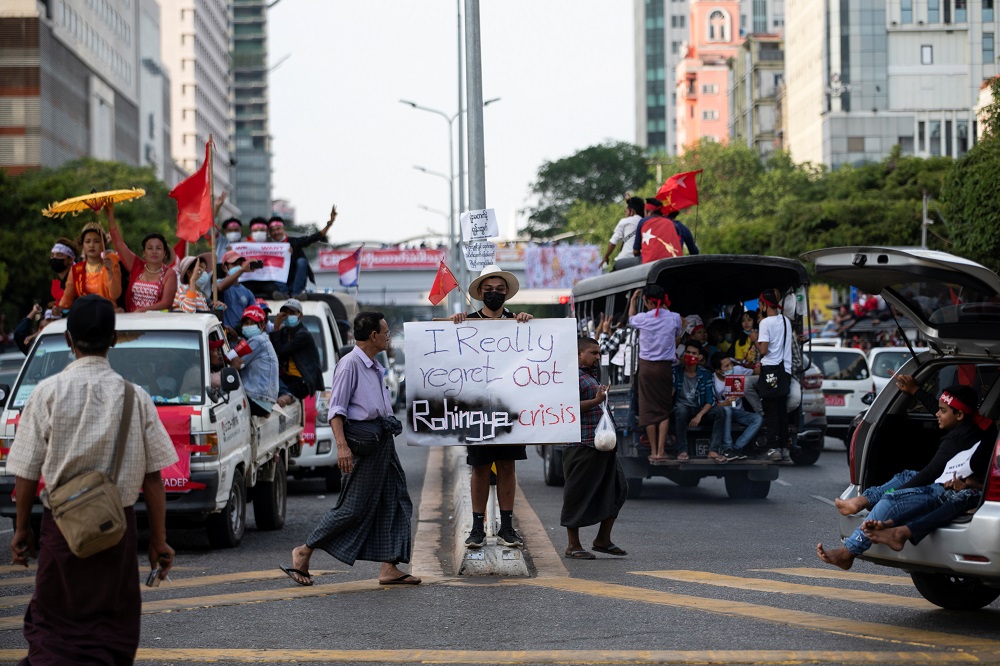YANGON, Feb 13 — Opposition to Myanmar’s new military regime intensified today as spontaneous neighbourhood watch groups mobilised to thwart arrests of anti-coup activists and the UN demanded the release of ousted leader Aung San Suu Kyi.
The army takeover that brought a decade-old democracy to an end last week has unleashed a storm of anger and defiance, with huge daily protests bringing urban centres around the country to a standstill.
Since taking Suu Kyi and her top allies into custody, troops have stepped up arrests of civil servants, doctors and others joining strikes demanding the generals relinquish power.
Crowds defied overnight curfews to mass on the streets as night fell, hours after finishing a seventh straight day of rallies, following rumours that police were preparing to launch a fresh wave of arrests.
One group swarmed a hospital in the city of Pathein on rumours that a popular local doctor would be taken, chanting a Buddhist prayer urging protection from harm.
“If I have problems, I will ask for your help,” doctor Than Min Htut told the group who had come to aid him, flashing the three-finger salute that has come to symbolise resistance to the coup.
Than Min Htut spoke to AFP today to confirm he was still free and would continue to participate in a civil disobedience campaign opposing military rule.
People in Yangon skirted a junta ban on Facebook to organise neighbourhood watch groups that warned of rumoured arrests.
They signalled calls to gather outside buildings by banging pots and pans — a nightly phenomenon in the days after the coup that is traditionally associated with driving out evil.
“We didn’t know who will be taken, but when we heard the sound, we went out to join our neighbours,” said Tin Zar, a storekeeper in Yangon’s north.
“Even if they shoot, we are not afraid,” she told AFP.
More than 320 people have been arrested since last week’s coup, according to the Assistance Association for Political Prisoners monitoring group.
An emergency session of UN Human Rights Council in Geneva called for the new regime to release all “arbitrarily detained” persons and hand power back to Suu Kyi’s administration.
The UN deputy rights chief Nada al-Nashif warned Myanmar in the Friday meeting that “the world is watching” events unfold in the country.
Protests nationwide
Hundreds of thousands have joined nationwide protests that have remained largely peaceful, though authorities have used tear gas, water cannon and rubber bullets to disperse some rallies.
At least two people in Naypyidaw were shot by police and critically injured, including one 20-year-old woman who remains in intensive care and has since become a symbol of opposition to the junta.
Officers cleared a sit-in protest by university students in the port city of Mawlamyine on Friday with rubber bullets, injuring several demonstrators.
Nine others taken into custody were later freed after a crowd mobbed a police station and demanded their release.
Authorities claimed protesters had thrown stones at officers who had tried to disperse the crowd, according to a Saturday report in the Global New Light of Myanmar.
The state newspaper also reported counter-protests by military supporters in various parts of the country, citing crowd estimates a small fraction of the anti-coup rallies seen this week.
Army chief Min Aung Hlaing has warned striking civil servants to return to work and the new regime has set up a hotline to report government employees joining demonstrations.
‘Internal affairs’
So far, the generals remain undeterred by the widespread condemnation on the streets — and overseas.
They justified seizing power with claims of widespread voter fraud in November’s election, which Suu Kyi’s National League for Democracy won in a landslide.
Washington this week imposed targeted sanctions against top military brass.
But traditional allies of the country’s armed forces, including Russia and China, have slammed the international outcry against the coup as interference in Myanmar’s “internal affairs”.
Suu Kyi has not been seen since her detention nearly two weeks ago. — AFP






















